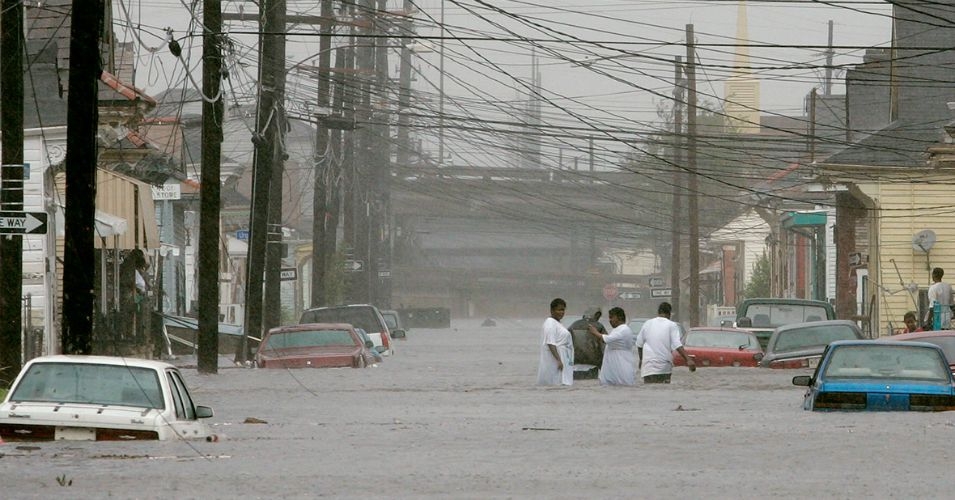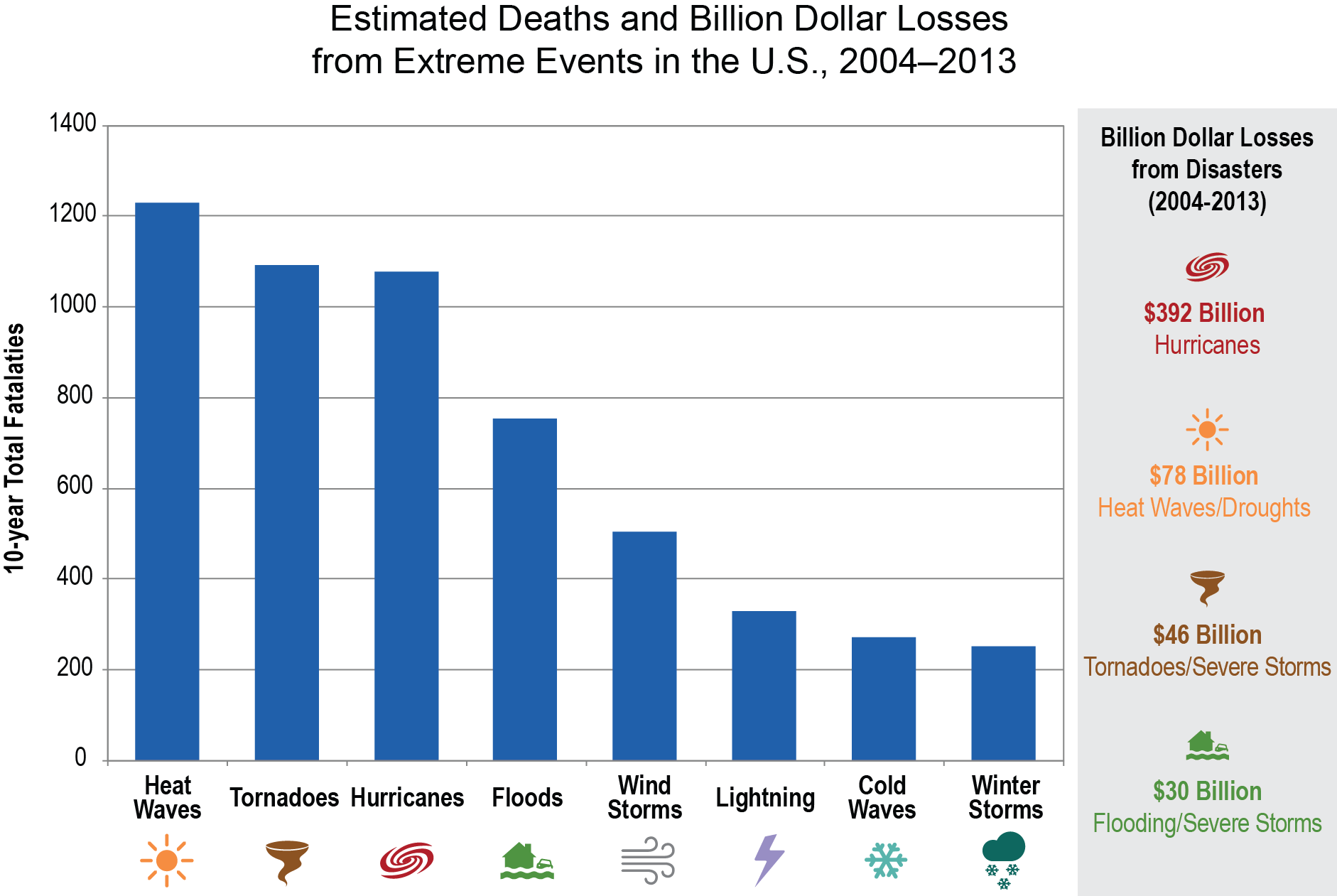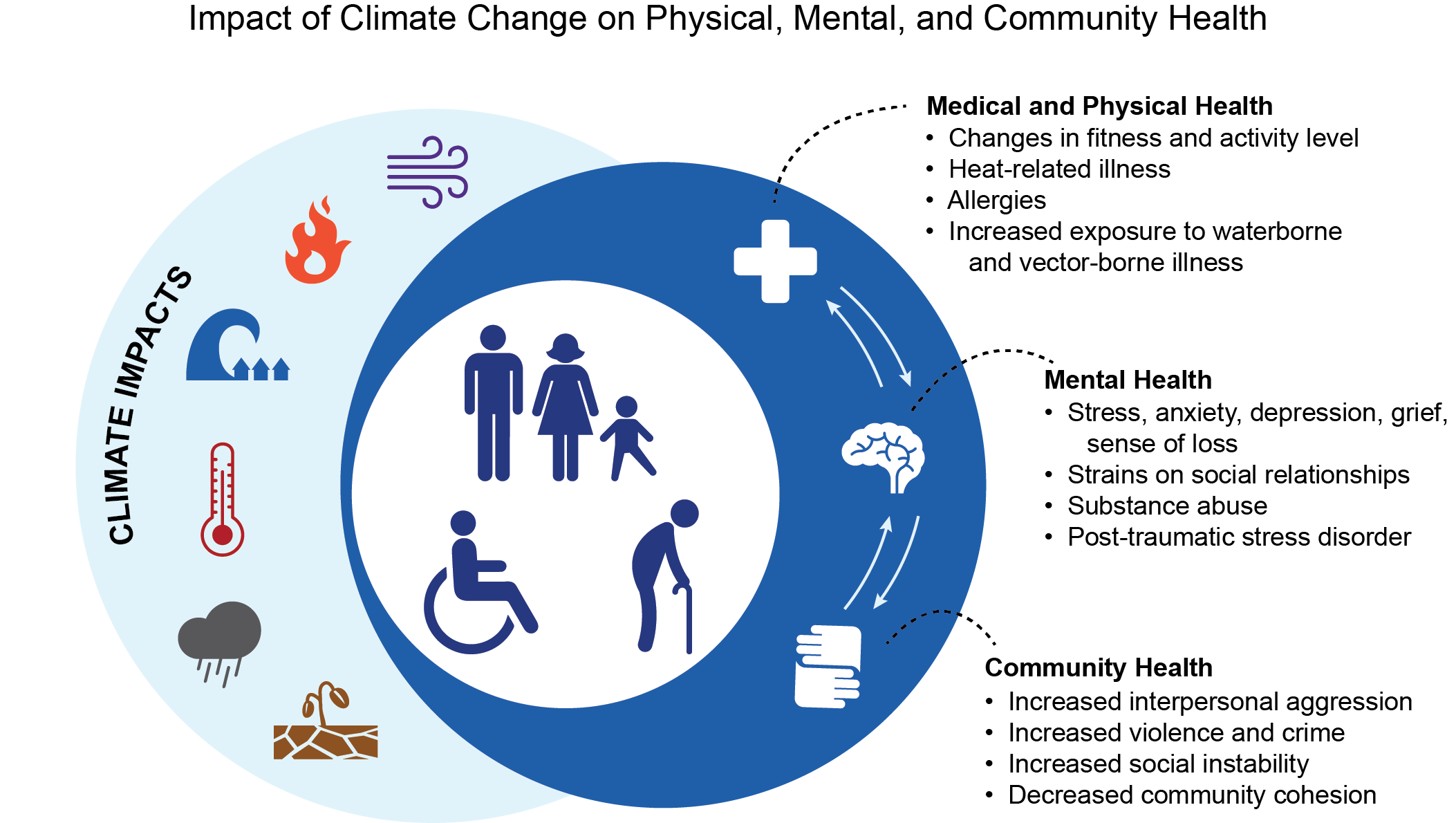
Streets of New Orleans following Hurricane Katrina
The U.S. Global Change Research Program (USGCRP) has released a new report – The Impacts of Climate Change on Human Health in the United States – that paints a very stark and troubling picture of the impact of climate change on our health. Coming as it does during a year of dramatic fluctuations in weather conditions throughout the continental United States, the report reveals that we have much to be concerned regarding the impact climate change has on our health and well-being.
The report indicates that rising greenhouse gas concentrations cause increases in temperature, changes in precipitation, increases in the frequency and intensity of some extreme weather incidents, and rising sea levels. Americans have witnessed all of these conditions across the nation, and in some instances, most pronounced in certain areas of the country. According to the report, climate change has affected our food and water sources, the quality of the air, the weather we experience and the built and natural environments.
While climate change affects all Americans, it can particularly impact certain segments of the population disproportionately. The report notes, “While all Americans are at risk, some populations are disproportionately vulnerable, including those with low income, some communities of color, immigrant groups (including those with limited English proficiency), Indigenous peoples, children and pregnant women, older adults, vulnerable occupational groups, persons with disabilities, and persons with preexisting or chronic medical conditions.”
Such a warning should give African-Americans reason for concern since many of these population characteristics fall within the Black community. The experience of New Orleans during Hurricane Katrina is a constant reminder of the vulnerabilities of pockets of African-Americans; the elderly, the poor, people with preexisting medical conditions and disabilities, and children. What we witnessed in the debacle that followed the flooding of New Orleans Lower Ninth Ward following that storm was a community that was under-resourced and unprepared to withstand an extreme weather event. One of the most profound impacts of Katrina is the realization of how many more lives would have been lost and how much more property damage would have resulted if the storm was at maximum strength at landfall.

Source: U.S. Global Change Research Program
It is not only New Orleans where African-Americans are vulnerable to extreme weather events due to climate change. The report also notes that climate change will increase the risk of coastal flooding due to increases in precipitation, rainfall rates, hurricane intensity, sea level rise, and storm surge. In the nation’s most populous city, New York City, extreme weather would adversely affect large swaths of the city where many Blacks reside. The city has already experienced the flooding of some of its subway tunnels during recent storms and hurricanes. The same vulnerability is present in any coastal city – Baltimore, Norfolk, and Hampton to suggest a few – and any area of high population concentration where mountains [mud slides], rivers [flooding], and trees [power lines, property damage] become destructive forces in an extreme weather event.
There are several findings in the report that are very compelling and should spur the nation into action. An increase from thousands to tens of thousands of premature heat-related deaths is projected in the summer and a decrease in premature cold-related deaths in the winter is forecasted. At the same time the report indicates an increase in the population’s tolerance for extreme heat. However, older adults and children have a higher risk of illness due to extreme heat.
The change in climate also impacts individuals with asthma as well. Given the chronic nature of asthma in the Black community, this should be of particular concern. Increased concentrations of atmospheric carbon dioxide, rising temperatures and altered precipitation patterns are expected to contribute to increases in the levels of some airborne allergens. The report predicts these conditions will lead to increases in asthma episodes and other allergic illnesses.
In addition to the physical trauma victims of Hurricane Katrina experienced, there was also the emotional and psychological impact of living through that event; if you were so lucky. The devastation witnessed by residents of New Orleans will have a lasting effect on individuals. The Impacts of Climate Change on Human Health in the United States notes, with high confidence, that health impacts tied to climate changes and exposure to extreme events include death, injury or illness, exacerbation of underlying medical conditions and adverse effects mental health. Some of the health consequences are post-traumatic stress disorder (PTSD), depression and general anxiety. Media and popular culture representations of climate change also influence stress responses.
One of the grave concerns the report highlights is that extreme weather events caused by climate change will also result in the disruption of essential infrastructure. Given the deterioration of the nation’s infrastructure, from bridges, roads and vehicular tunnels to water tunnels, there should be considerable attention paid to potential disruptions in access and operation. Essential infrastructure includes power, water, transportation and communication systems; any service that maintains access to health care, responds to emergencies and safeguards human health. Increases in storm surge can impact the infrastructure for drinking water, wastewater and storm water, and when systems fail there is a risk to water-related pathogens, chemicals and algal toxins when treatment barriers fail.

Source: U.S. Global Change Research Program
The Impacts of Climate Change on Human Health in the United States warns that our food supply is also vulnerable as a result of extreme weather due to climate change. The report indicates that climate change will increase human exposure to chemical contaminates in food due to elevated levels of mercury, while other contaminates are introduced into the food chain, and rising carbon dioxide levels lowers the nutritional value of foods. In addition, if food distribution infrastructure fails, there will be a slowing of food shipments.
Taken collectively, these findings should motivate the nation to begin to take more seriously the potential danger of extreme weather that is occurring as a result of climate change. While all predictions of outcomes are just that, predictions, the weather activity we have witnessed in recent years should be enough to command our attention. Per the report, “This assessment’s findings represent an improvement in scientific confidence in the link between climate change and a broad range of threats to public health, while recognizing populations of concern and identifying emerging issues. These considerations provide the context for understanding Americans’ changing health risks and allow us to identify, project and respond to future climate change health threats. The overall findings underscore the significance of the growing risk climate change poses to human health in the United States.”
The U.S. Global Change Research Program (USGCRP) has been developed to assess the growing threat of climate change. The report responds to a congressional mandate from 1990 “to assist the nation in understanding, assessing, predicting, and responding to human-induced and natural processes of global change.”




















